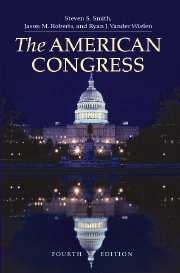Book contents
- Frontmatter
- Contents
- Preface
- 1 The American Congress: Modern Trends
- 2 Representation and Lawmaking in Congress: The Constitutional and Historical Context
- 3 Congressional Elections and Policy Alignments
- 4 The Rules of the Legislative Game
- 5 Members, Goals, Resources, and Strategies
- 6 Parties and Leaders
- 7 The Standing Committees
- 8 The Floor and Voting
- 9 Congress and the President
- 10 Congress and the Courts
- 11 Congress, Lobbyists, and Interest Groups
- 12 Congress and Budget Politics
- Notes
- Suggested Readings
- Index
- Picture Credits
8 - The Floor and Voting
- Frontmatter
- Contents
- Preface
- 1 The American Congress: Modern Trends
- 2 Representation and Lawmaking in Congress: The Constitutional and Historical Context
- 3 Congressional Elections and Policy Alignments
- 4 The Rules of the Legislative Game
- 5 Members, Goals, Resources, and Strategies
- 6 Parties and Leaders
- 7 The Standing Committees
- 8 The Floor and Voting
- 9 Congress and the President
- 10 Congress and the Courts
- 11 Congress, Lobbyists, and Interest Groups
- 12 Congress and Budget Politics
- Notes
- Suggested Readings
- Index
- Picture Credits
Summary
When the gavel fell at 5:51 a.m. on november 22, 2003, the final tally was 220–215 and the House of Representatives had passed a prescription drug benefit for senior citizens under the Medicare programs. Passage of the bill was a major victory for the House Republican leadership and President Bush, but for much of the night it looked like the bill would go down to defeat. Debate on the bill had continued until 3:00 a.m. at which time presiding officer Richard Hastings (R-Washington) announced that the House would have a 15-minute vote. At the end of 15 minutes the bill was losing by 15 votes, and after one hour, the tally stood at 216–218. By most accounts, Speaker Dennis Hastert (R-Illinois) was resolved to the fact that the bill would fail, but he along with Majority Leader Tom DeLay (R-Texas) and others continued to try to convince recalcitrant Republicans to vote for the bill. At 5:00 a.m., President Bush was awakened to begin calling wayward members. The combination of his encouragement and other persuasive activities was enough to secure victory. Democrats were outraged that the vote had been held open so long. The episode had another interesting twist: Michigan Republican Nick Smith alleged that his own party leader, Majority Leader Tom DeLay (R-Texas), had offered to provide $100,000 and a public endorsement for Smith's son, who was running for the House, in exchange for his vote.
- Type
- Chapter
- Information
- The American Congress , pp. 241 - 270Publisher: Cambridge University PressPrint publication year: 2005

